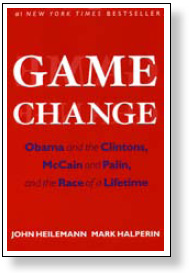Today’s Machining World Archive: April 2010 Vol. 6, Issue 03
Game Change by John Heilemann and Mark Halperin is the story of the 2008 presidential race, both the primary battles and the general election. In spite of the title, there actually were few true “game changers,” just tough old politics, the economic climate and money, money, money.
 The candidates became larger than life celebrities playing in a 24/7 multimedia spectacular. Certain candidates selfdestructed, afflicted by scandals, political miscues, lack of money and or lack of energy. In the end Barack Obama emerged the winner, as he was the best-positioned candidate for the times.
The candidates became larger than life celebrities playing in a 24/7 multimedia spectacular. Certain candidates selfdestructed, afflicted by scandals, political miscues, lack of money and or lack of energy. In the end Barack Obama emerged the winner, as he was the best-positioned candidate for the times.
Reading Game Change I gained a greater respect for the three main characters: Hilary Clinton, John McCain and Obama. However, both John and Elizabeth Edwards come off even worse than they did in the press and the book depicts Sarah Palin as so far out of her league that one has to feel for her. Her collapse certainly hurt McCain, but he lost the election on his own. His mishandling of the economic crisis and the White House meeting in September 2008, along with the country’s desire for someone and something different than George Bush, led to his defeat.
The insight in the book on the personal relationships of the candidates with one another is fascinating. Clinton and McCain were close friends, having traveled the globe together. A story of the two getting drunk together in Estonia on vodka shots is a Washington favorite. McCain was greatly disappointed when she lost the nomination, even calling to console her.
In contrast, McCain and Obama growingly disliked each other. This stemmed from early 2006 when McCain asked Obama to collaborate with him and a small group of reformers on ethics legislation. McCain has a history of working across the aisle on reform issues, such as with Ted Kennedy on immigration, Russ Feingold on campaign finance, and Joe Lieberman on ethics. Obama at first showed an interest in working with McCain but then snubbed him, sending him a letter backing out, but only after first releasing it to the press and muddying the whole bipartisan effort. Obama behaved similarly trying to embarrass McCain in a bipartisan group working on immigration, and a new GI bill where he publicly and quite disingenuously insinuated that McCain was too cheap to help veterans.
It was clear by early 2007 that Obama had begun his run for president and that he knew McCain would be his chief rival. He wasn’t going to give McCain any bipartisan political victories. Obama’s tough-minded political ambition was showing itself.
The ineptness of McCain’s campaign was highlighted in his vice-presidential selection process. McCain clinched the nomination early and had several months to thoroughly vet his running mate. Behind in the polls by double digits, he desperately needed a gamechanging nominee. He favored his old friend Joe Lieberman, but both polling research and party elders thought Lieberman would hurt McCain with the party’s base and not gain him much with independents. The search dragged on, with three thoroughly vetted but unexciting white males on the short list.
But then, just 36 hours before the announcement, from the longest of long lists came Sarah Palin. She was attractive, confident and passed the initial interview, although she had hardly been vetted at all. It was assumed that she had an average governor’s knowledge base, and that McCain’s team could work with her. How little she knew and how little she was capable of or interested in learning, eluded the vetting team.
Initially Palin appeared to be a game changer in the election. Practically overnight McCain soared from 12 to 15 points behind, to dead even with Obama. The campaign planned to use her to take the initiative from the Democrats, but they quickly learned Sarah Palin was not ready for prime time. Her eventual collapse hurt the campaign but was ultimately overshadowed by McCain’s own collapse during the September 2008 financial crisis.
The final irony of the 2008 presidential race was the coming together of Obama and Clinton, reminiscent of Lincoln and Seward. In both cases the newcomer from Illinois defeated the old hand from New York and then appointed them Secretary of State. Seward was a great friend, adviser and support to Lincoln through the darkest days. Obama and Clinton have wonderful role models to follow.
Comments? You can email Jerry Levine at jerroldlevine@yahoo.com
